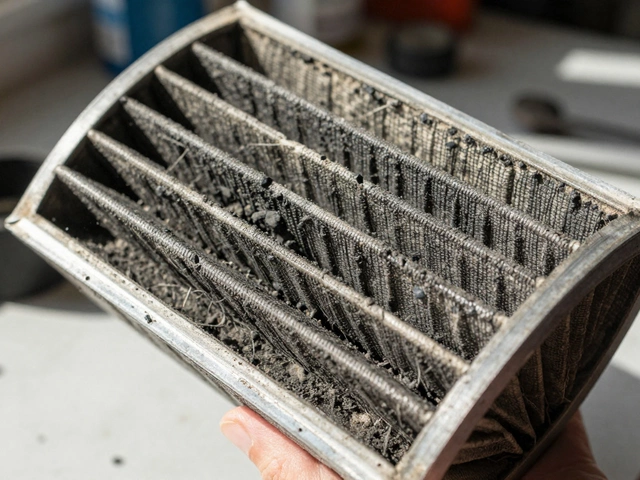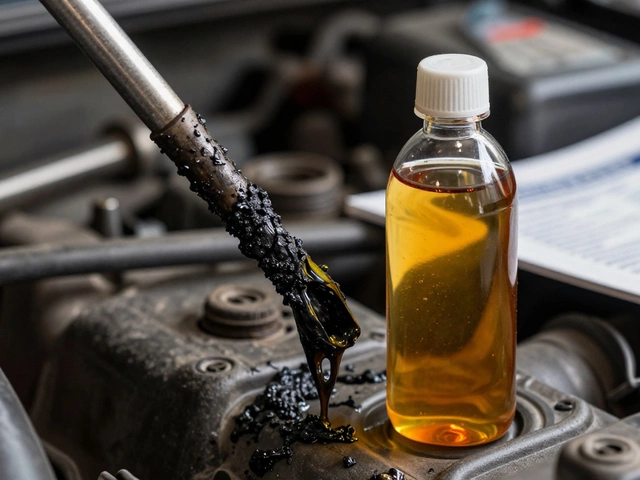
Spark plugs, those small but mighty components in your engine, are crucial for getting your car fired up and running smoothly. They're the little heroes that ignite the fuel and air mixture, setting your pistons in motion and getting your wheels rolling. But just like any hero, they need a bit of attention now and then to stay in top shape.
Ever wondered how often you should clean them? It’s not exactly a one-size-fits-all answer. Generally speaking, cleaning your spark plugs every 20,000 to 30,000 miles is a good rule of thumb. However, your driving habits and environment can play a big part in this. Drive on dusty roads or sit in traffic often? You might want to check them more regularly.
Keeping an eye out for warning signs like your engine misfiring, poor fuel economy, or trouble starting can also be the cue that it's time to grab those cleaning tools. While modern spark plugs are pretty resilient, neglecting them can lead to bigger issues down the line, costing you more in repairs.
- Understanding Spark Plugs
- Signs Your Spark Plugs Need Cleaning
- Why Regular Cleaning is Important
- How Often to Clean Spark Plugs
- Effective Cleaning Techniques
- Preventative Measures and Tips
Understanding Spark Plugs
Spark plugs are an essential part of your vehicle's engine. They might be small, but they pack a powerful punch when it comes to starting your car. Their main job? Delivering that electric spark needed to ignite the fuel-air mix in the engine cylinders. Without spark plugs, your car wouldn’t even start.
But what exactly are they made of? Typically, modern spark plugs have a shell of nickel alloy, an insulator made of ceramic, and a core electrode made of copper. The key for their longevity lies in the materials; for example, some high-end models use platinum or iridium, which are known for their durability.
"A clean and well-maintained spark plug can be the difference between a smooth ride and a trip to the mechanic," says auto expert Jamie Pearson from Motor Tech Weekly.
Now, let's talk a bit about how they work. When you turn the ignition key, the car battery sends a high-voltage current to the spark plugs. This creates a spark that leaps across a small gap at the plug's tip, igniting the air-fuel mixture in your engine.
What Makes a Spark Plug Go Bad?
They can wear out from normal use, but what really shortens their life is build-up. Deposits from fuel additives or oil leaks can coat the tips of the plugs. Over time, this layer gets thicker, which can interfere with the spark.
Temperature changes can also affect spark plugs. Repeated heating and cooling cause them to expand and contract, which might lead to cracks and degradation. For those who love numbers, a study noted that engines lose between 1-2% efficiency for each 0.001-inch increase in spark plug gap. It's a small number that can make a big difference over time.
In newly manufactured cars, replacement of spark plugs isn’t needed that frequently thanks to better quality materials and design. But, keeping them clean is equally as important to ensure fuel efficiency and a smooth running engine.
Signs Your Spark Plugs Need Cleaning
Spark plugs might be small, but they pack a punch when it comes to keeping your engine running smoothly. When they start to get dirty, your car may send out a few distress signals. Knowing these signs can save you a lot of trouble and maybe even some cash.
Engine Misfire
If your engine hesitates or misfires, your spark plugs could be the culprit. Dirty plugs can fail to ignite the fuel-air mixture properly, causing your engine to stumble. If this happens often, it's a sign that they might need a good clean.
Poor Fuel Economy
Noticing you're stopping for gas more than usual? Spark plugs that aren't firing efficiently can lead to poor fuel economy. They're forcing your engine to work harder than it should, burning more fuel in the process.
Rough Idling
If your car feels shaky while idling, it might be due to fouled spark plugs. This vibration can happen because your engine's not firing on all cylinders, literally. A clean set of plugs can smooth things out.
Difficulty Starting
Hard starts are another clue. If your car struggles to turn over, especially on cold mornings, it might be time to check those spark plugs. Clean plugs provide the necessary spark to start your engine reliably.
Engine Knocking
Hearing a knocking sound from under the hood? This can be a more technical sign of spark plug issues. When plugs don't spark correctly, your engine can start combusting unevenly, leading to that notorious knock.
Regularly inspecting your spark plugs can help you catch these issues early. Use these signs as a checklist the next time your car starts acting up, and you might find a simple cleaning is all it takes to get things back to normal.
Why Regular Cleaning is Important
Cleaning your spark plugs regularly isn't just about keeping things neat and tidy; it's crucial for maintaining your car's overall health. These small parts play a massive role in ensuring your engine runs efficiently, and neglecting them can lead to a slew of problems.
Improving Engine Performance
When spark plugs are clean, they can efficiently ignite the fuel-air mixture in the combustion chamber. This means a smoother running engine, which translates to better acceleration and performance. If they're dirty or clogged, you might notice your engine performs sluggishly, or even worse, it could misfire.
Boosting Fuel Efficiency
No one likes spending more on fuel than necessary. Clean spark plugs help ensure that fuel is burned more completely, reducing the wastage you'd otherwise experience if the plugs are dirty. This means you get more miles for your money, saving you trips to the gas station.
Reducing Emissions
Properly functioning spark plugs help reduce harmful emissions by enabling cleaner combustion, which is not only better for your car but also for the environment. Incomplete combustion due to faulty plugs can increase unburned hydrocarbons and other pollutants.
Avoiding Costly Repairs
Neglecting spark plug maintenance can lead to significant engine damage over time, which means more money out of your pocket for repairs. Regular checks and cleaning help you spot potential issues early, preventing more severe problems down the line.
By cleaning and inspecting your spark plugs routinely, you're investing in your vehicle’s longevity and keeping those unwanted headaches at bay.

How Often to Clean Spark Plugs
Deciding how often to clean your spark plugs isn't set in stone, but a good rule of thumb is every 20,000 to 30,000 miles. That might seem like a wide range, but it really depends on your car and how you drive it. Some vehicles with high-performance engines might need a little more TLC, so always check what your car's manual suggests.
Everyday Driving vs. Tough Conditions
If your commute looks like the average drive to the office and back, sticking with the standard cleaning interval usually works. But if you're tackling dusty roads, hauling heavy loads, or love a good backroad adventure, your engine maintenance game needs a little boost. Those conditions can clog up your spark plugs faster.
So, how do you really know when to clean them? Well, if you've been noticing your car doing things like misfiring, being a little sluggish on the start-up, or not running as smoothly, it's probably time to get under the hood.
The Importance of Regular Checks
Regular checks are super important because they help spot any early signs of trouble before they become expensive repairs. Plus, it keeps your car running efficiently, which means better fuel economy and performance.
Some mechanics recommend checking spark plugs at every oil change. While that might sound a bit too much, it's not a bad habit to get into. It ensures your plugs are looking good and gives a clear picture of your car maintenance needs.
| Driving Condition | Recommended Cleaning Interval |
|---|---|
| Normal City Driving | 20,000 - 30,000 miles |
| Dusty or Off-Road | 15,000 - 20,000 miles |
| High-Performance Engines | 10,000 - 15,000 miles |
Ultimately, paying attention to your vehicle's cues and keeping consistent with maintenance will keep your spark plugs, and by extension your engine, happy and healthy.
Effective Cleaning Techniques
When it comes to keeping those spark plugs in great shape, knowing how to clean them properly is essential. Let’s take a look at the tried-and-true methods you can use to spruce up those little powerhouses.
Gather Your Cleaning Supplies
First off, you’ll need a few tools—grab a spark plug socket, a wire brush, some sandpaper, and a cleaning solvent. Having these on hand will make the cleaning process a whole lot smoother.
Step-by-Step Cleaning
- Remove the Spark Plugs: Make sure your engine is cool before you start. Use your spark plug socket to gently remove one spark plug at a time so you don’t mix up the firing order.
- Inspect the Plugs: Check for signs of wear or damage. If the electrodes are burned out or there’s heavy build-up, it might be time to replace them rather than clean them.
- Scrub Away Build-up: Use the wire brush to gently scrub the stubborn carbon deposits off the electrodes. This preps the plug for a deeper clean.
- Sand It Smooth: Use fine-grit sandpaper to polish the electrodes until they shine. This step ensures the plugs can function at their best.
- Apply Cleaning Solvent: Spray some cleaning solvent on the plug's threads and electrodes, allowing it to dissolve any remaining grime. Wipe it down with a clean cloth thoroughly.
- Dry and Reinstall: Let the plugs dry completely before putting them back. Reinstall them using the correct torque so they sit snugly in the engine.
Bonus Tip: Check the Gap
While you’re at it, don’t forget to check the spark plug gap. If it’s too wide or too narrow, it might affect the spark. Use a gap tool to set it right based on your car’s specs.
| Tool | Average Cost |
|---|---|
| Spark Plug Socket | $10 - $15 |
| Wire Brush | $5 - $10 |
| Sandpaper | $2 - $5 |
| Cleaning Solvent | $5 - $10 |
Cleaning your spark plugs isn’t just about performance; it’s a way to save money and keep your ride feeling fresh on the road. So, roll up those sleeves and give your engine the attention it deserves!
Preventative Measures and Tips
Staying on top of your car maintenance game can save you a lot of hassle and money down the road. When it comes to spark plugs, a bit of preventative care goes a long way. Here are some handy tips and tricks to keep your engine running smoothly and your plugs in good condition.
Regular Inspections
Catching a problem early is the best way to prevent costly repairs. Make it a habit to inspect your spark plugs periodically, even before you hit the 20,000-mile mark. Look for signs of wear or buildup, which can clue you in on issues before they escalate.
Proper Installation
When installing new spark plugs, make sure you use the correct torque setting. Over-tightening can damage the plug or the engine threads. If you're unsure, it's always smart to check your vehicle's manual or consult a professional.
Quality Matters
Cheap plugs might save you a few bucks upfront but can cost more in the long run. Opting for high-quality spark plugs, especially ones recommended for your vehicle model, ensures better performance and longevity.
Keep it Clean
Dirt and grime are the enemies of spark plug performance. Ensure that the area around your plugs is clean when you check them. A simple wipe-down can prevent debris from falling into the combustion chamber when you remove a plug.
Use Additives
Fuel additives can help with reducing deposits on your spark plugs. They work by cleaning injectors and combustion chambers, ensuring cleaner spark plug tips.
Monitor Driving Conditions
If you find yourself frequently driving in harsh conditions – think dusty roads or heavy traffic – you might need more frequent checks on your plugs. These environments can lead to quicker buildup of deposits, affecting performance.
| Item | Action | Frequency |
|---|---|---|
| Inspection | Visual check for wear | Every 15,000 miles |
| Cleaning | Remove deposits | Every 20,000-30,000 miles |
| Replacement | Install new plugs | Every 60,000-100,000 miles |
With these measures, you're not just ensuring your spark plugs stay in tip-top condition, but you're also maintaining optimal engine performance. It's a small effort that pays off in the long haul.





